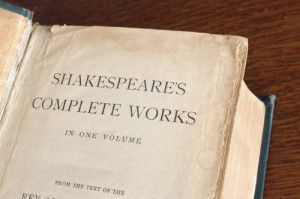Today is the official anniversary of William Shakespeare’s birth. (23rd April is also the day he died, but let’s not dwell on that.) For those of us who speak English every day, we often forget, or don’t realise, how many of the words and phrases we use come from the works of Shakespeare.
Of course we don’t know for sure that he invented them all himself (although apparently about a tenth of the words he used in his work were new). But it’s interesting to see how many of us, even those who claim not to be fans of his work, are regularly quoting Shakespeare.
There are so many examples of these – here are just a few.
Green-eyed monster
What does it mean? Jealousy.
Which play? Othello (Act III, scene 3) – although Shakespeare had earlier used ‘green-eyed’ to describe jealousy in The Merchant of Venice (Act III, scene 2).
“IAGO: O, beware, my lord, of jealousy;
It is the green-eyed monster which doth mock
The meat it feeds on”
Cruel to be kind
What does it mean? Treating someone badly for their own good.
Which play? Hamlet (Act III, scene 4)
“HAMLET: I must be cruel only to be kind.
Thus bad begins and worse remains behind.”
It’s all Greek to me
What does it mean? Completely incomprehensible.
Which play? Julius Caesar (Act I, Scene 2)
“CASCA: those that understood him smiled at one another and shook their heads; but, for mine own part, it was Greek to me.”
Break the ice
What does it mean? To get a conversation going, often by breaking some initial tension.
Which play? The Taming of the Shrew (Act I, Scene 2)
“TRANIO: And if you break the ice and do this feat,
Achieve the elder, set the younger free”
In a pickle
What does it mean? In a tricky situation.
Which play? The Tempest (Act V, Scene 1)
“ALONSO: How camest thou in this pickle?”
Forever and a day
What does it mean? A really long time!
Which play? As You Like It (Act IV, Scene 1)
“ROSALIND: Now tell me how long you would have her after you have possessed her.
ORLANDO: Forever and a day.”
The world’s my oyster
What does it mean? To have a wealth of opportunities.
Which play? The Merry Wives of Windsor (Act II, Scene 2)
“PISTOL: Why then the world’s mine oyster, Which I with sword will open.”
One fell swoop
What does it mean? All at once.
Which play? Macbeth (Act IV, Scene 3)
“MACDUFF: What, all my pretty chickens and their dam
At one fell swoop?”
Good riddance
What does it mean? To be glad to see the back of someone.
Which play? Troilus and Cressida (Act 2, Scene 1)
“THERSITES: I will keep where there is
wit stirring and leave the faction of fools.
[Exit]
PATROCLUS: A good riddance.”
Eaten out of house and home
What does it mean? To take advantage of a host’s generosity.
Which play? Henry IV Part II
“MISTRESS QUICKLY: He hath eaten me out of house and home; he hath put all my substance into that fat belly of his”
How many of these have you used lately? And does anyone have any other favourite Shakespearean phrases?
Personally, we’re a bit disappointed that more of Shakespeare’s insults haven’t made it into modern English; you don’t hear ‘thou cream-faced loon’ often enough these days (although maybe that’s a good thing).
I have been told that it has been documented but not irrevocally proved that the 17th Earl of Oxford wrote the plays that have been given credit to the actor and sometime playrite Shakespeare ( only 1 or 2 known pieces of his handwriting- spelling his last name in two different ways are known and none of the plays or sonnets in his own handrighting. exist.